I’ve fallen out of the habit of doing these round-ups since the panini started. But I want to return to it because it’s kind of fun thinking back over the last year’s media.
This year, I’m gonna break up my usual post into two parts: my favourite films and my favourite TV shows. Here we go.
Number 5: Nope. I confess that the earliest trailers for this film were largely incomprehensible to me. I had no idea what the film was about (except, broadly, horses and UFOs), and that didn’t particularly move me to seeking it out. But Sio suggested that we try it one night, and I was particularly struck by the relative originality of the story, especially in regards to the UFO element. I hesitate to say much more about plot, because part of the enjoyment, for me, was watching the various discoveries emerge. There were moments when I found myself pondering: “why does this particular side-story exist in the film?” but by the end was really satisfied with the cohesiveness of the film. I’m torn about the original trailers: on the one hand, I really enjoyed not having the trailers spoil the story beats for me, but on the other hand, I don’t think they did a very good job of enticing me to see the film.
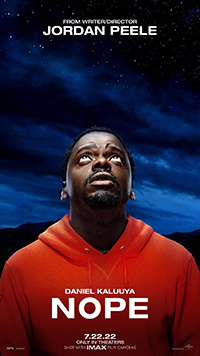
Number 4: Good Luck to You, Leo Grande. In this film, Emma Thompson plays a relatively-recently widowed woman who acknowledges that she’s never had a satisfying sex life. So her solution to this is to hire a sex worker, Leo Grande, who she meets up with for a few session at a hotel room. And although she’s done this very deliberately, she’s still someone who has to slough off years of puritanism and guilt and shame. In the first session, she’s struggling a lot with shame about her age (and the fact that she specifically chose a sex worker who’s much younger than her). Watching her character evolve session after session is a delight. The movie is funny and charming and surprisingly frank.
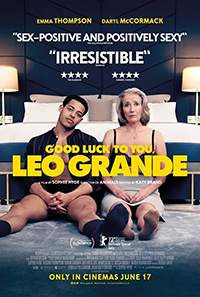
Number 3: Breaking. On the one hand, this film seems to follow in the footsteps of other films — John Q. comes immediately to mind — where a good person is being screwed over by the system, and takes some dramatic action to set things right even if it costs them their freedom. In this case, Boyega plays Brian Brown-Easley who holds up a bank because the local VA branch has garnished his cheque to apply against student debts. He’s not there to steal a lot of money; in his mind, he wants his own money back. The film is less bombastic than other such such entries in this category. In John Q., it’s easy to see the insurance company as evil; in Breaking, the VA is banal in its systemic failures. People start to empathize with Brown-Easley, but there’s no overwhelming public support for what he’s doing. The one group that does end up looking bad is the cops, who seem content to dither time away “setting up” and want to use time as a way wearing down Brown-Easley, and don’t seem especially concerned that there are hostages in the bank who are terrified. Overall, the film is very slice-of-life-y, which I think gives it a deeper emotional resonance. It helps, also, that Boyega is magnificent, playing a man who knows that he’s taking a dramatic step, but is trying to be as reasonable as possible under the circumstances. Nicole Beharie is also stellar as the bank manager who is terrified that she’s going to die, but is also sympathetic to Brown-Easley’s pain.
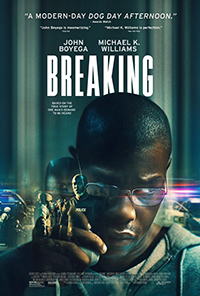
Number 2: Emily the Criminal. I watched this one fairly recently, and I might still be riding the high of it. I recently described this film like a much shorter version of Breaking Bad: the key difference is that whereas Walter White’s character arc is driven by his sense that life owes him more, Emily’s criminal journey comes about because she’s unable to break even. She has a past conviction, which keeps her from landing a good job that she needs to pay off her $70K student debt. She initially gets involved with local credit card scammers for a bit of extra cash, but quickly sees petty crime as the only road in which she can actually get ahead. Like Breaking Bad, she has to come to terms the unseemly side of her criminal career: betrayals, violence, and so forth. And she does so, without much angst or wallowing. And every time it seems like she might find a path outside of crime, the system is there to remind her that she’s going to be exploited. I’ve grown to really enjoy Aubrey Plaza in many of the things I’ve seen her in: I first took noticed of her in Legion, and she was one of the best parts of Happiest Season. There is an absolutely amazing scene between Plaza and Gina Gershon (who, basically, only appears in this one scene) where Plaza is being interviewed for a job where her friend works, only to discover in the interview that it’s actually an internship. And she ends up arguing, “how can you be okay with asking people to work for free?” The juxtaposition between that and, say, fencing TVs, is really interesting.
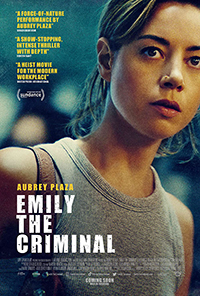
Content warning: talk of suicide.
Number 1: All My Puny Sorrows. I’ve written about this before. I adored this film. I think I saw Allison Pill in three different things this year: first she was Agnes Jurati, who was clearly the MVP of this season of Star Trek: Picard; then on a recommendation, I checked out Devs, in which she’s amazing. And then this film. All My Puny Sorrows is about suicide. Pill plays Yoli, a former member of a Mennonite community whose world-renowned, piano-playing sister, Elf, attempts suicide. Unlike many films, where suicide is a shock-value story beat, this film was much more about doing hard mental health work in the midst of complex family interactions. Characters are overwhelmed, and heartbroken, and angry. But able to use their words. The script, which is, of course, derived from Toews’ book, has beautiful, poignant dialog that is literate and witty but wrapped up in incredible pain.
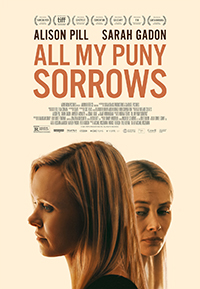
Of course, there were a large number of runners-up. I’ve previously written about Being the Ricardos, which I adored. I thought Cyrano was amazingly well-done, and emotionally resonant; I was just a bit less enthused with the musical aspects of it. I saw an amazing filmed production of Uncle Vanya — a stage production that was filmed after the lockdown forced them to stop the live performances.
I’ve never really been a huge fan of the Dune story, but I agree with a friend who said that the visuals and the world building were amazing in the latest version of the film. Dual was a surprisingly good, quirky, indie film. I really enjoyed another film, Where the Crawdads Sing, which was presented as a courtroom drama but was much more a character study of a woman who grows up as an outcast in the marsh, in the 60s. Beans, a Canadian film set against the backdrop of the Oka Crisis, didn’t always hit the mark, but was pretty good.
I was a bit disappointed by Everything Everywhere All at Once: there was a lot of stuff to like, but the humour was a bit too puerile for me. And it had been hyped up so much, by the time I saw it, that I don’t think it could have lived up to the expectations that had been built up. I had been really interested in seeing Belfast, but ended up finding it a bit too plodding.
So, there we have it. My top films of 2022.
